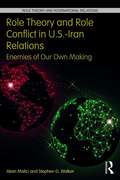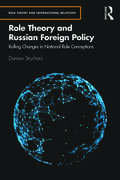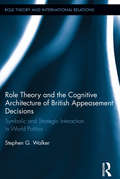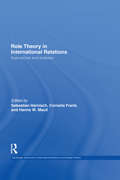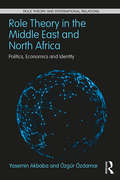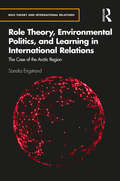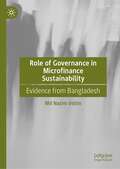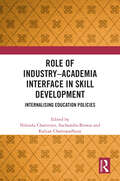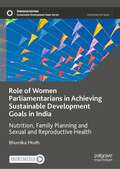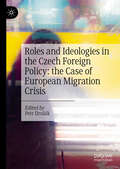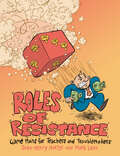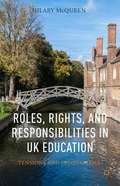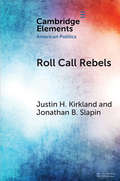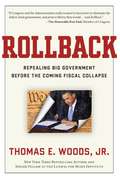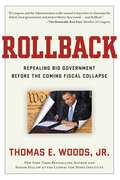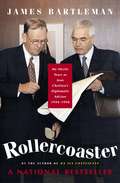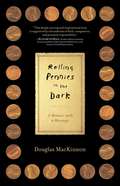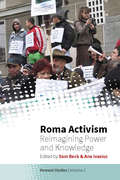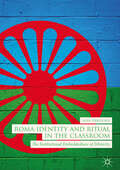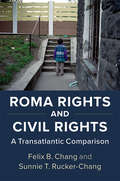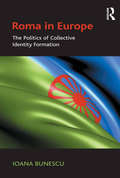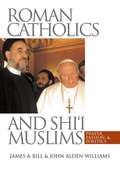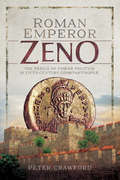- Table View
- List View
Role Theory and Role Conflict in U.S.-Iran Relations: Enemies of Our Own Making (Role Theory and International Relations)
by Stephen G. Walker Akan MaliciU.S.-Iran relations continue to be an international security problem in the Middle East. These two countries could have been friends, but instead they have become enemies. Stating this thesis raises the following questions: Why are the United States and Iran enemies? How and when did this relationship come to be? When the relationship began to deteriorate, could it have been reversed? What lessons can be learned from an analysis of past U.S.-Iranian relations and what are the implications for their present and future relations? Akan Malici and Stephen G. Walker argue that the dynamics of U.S.-Iran relations are based on role conflicts. Iran has long desired to enact roles of active independence and national sovereignty in world politics. However, it continued to be cast by others into client or rebel roles of national inferiority. In this book the authors examine these role conflicts during three crucial episodes in U.S.-Iran relations: the oil nationalization crisis and the ensuing clandestine coup aided by the CIA to overthrow the Iranian regime in 1950 to 1953; the Iranian revolution followed by the hostage crisis in 1979 to 1981; the reformist years pre- and post- 9/11 under Mohammad Khatami from 1997 to 2002. Their application of role theory is theoretically and methodologically progressive and innovative in illuminating aspects of U.S.-Iran relations. It allows for a better understanding of the past, navigating the present, and anticipating the future in order to avoid foreign policy mistakes. Role Theory and Role Conflict in U.S.-Iran Relations is a useful resource for international relations and foreign policy scholars who want to learn more about progress in international relations theory and U.S. relations with Iran.
Role Theory and Russian Foreign Policy: Rolling Changes in National Role Conceptions (Role Theory and International Relations)
by Damian StrycharzDespite the increased interest in Russia and its international behaviour, current analyses leave much unexplained. Damian Strycharz fills this gap in the literature by analysing leaders’ perceptions and the interactions between internal and external factors shaping foreign policy decisions. Challenging existing interpretations of Russian foreign policy and advancing our understanding on how role dynamics occur in non-democracies, Strycharz examines Russia’s reactions to the 2003–4 colour revolutions in Georgia and Ukraine, the Five-Day War in Georgia, and the Euromaidan Revolution. He argues that divergent reactions to these upheavals result from a profound change in the leadership perceptions of Russia’s international responsibilities. Consequently, a shift in the understanding of Russia’s international duties and departure from the Western partner role resulted in more assertive foreign policy behaviour exemplified by the intervention in Georgia and the annexation of Crimea. The book demonstrates that processes of foreign policy formation in Russia are more complex and include more actors than commonly assumed. Role Theory and Russian Foreign Policy is an ideal resource for scholars and researchers of international relations, foreign policy, and post-Soviet politics.
Role Theory and the Cognitive Architecture of British Appeasement Decisions: Symbolic and Strategic Interaction in World Politics (Role Theory and International Relations)
by Stephen G. WalkerAppeasement is a controversial strategy of conflict management and resolution in world politics. Its reputation is sullied by foreign policy failures ending in war or defeat in which the appeasing state suffers diplomatic and military losses by making costly concessions to other states. Britain’s appeasement policies toward Germany, Italy, and Japan in the 1930s are perhaps the most notorious examples of the patterns of failure associated with this strategy. Is appeasement’s reputation deserved or is this strategy simply misunderstood and perhaps improperly applied? Role theory offers a general theoretical solution to the appeasement puzzle that addresses these questions, and the answers should be interesting to political scientists, historians, students, and practitioners of cooperation and conflict strategies in world politics. As a social-psychological theory of human behavior, role theory has the capacity to unite the insights of various existing theories of agency and structure in the domain of world politics. Demonstrating this claim is the methodological aim in this book and its main contribution to breaking new ground in international relations theory.
Role Theory in International Relations: Approaches And Analyses (Routledge Advances in International Relations and Global Politics #90)
by Sebastian Harnisch Cornelia Frank Hanns W. MaullRole Theory in International Relations provides a comprehensive, up-to-date survey of recent theoretical scholarship on foreign policy roles and extensive empirical analysis of role behaviour of a variety of states in the current era of eroding American hegemony. Taking stock of the evolution of role theory within foreign policy analysis, international relations and social science theory, the authors probe role approaches in combination with IR concepts such as socialization, learning and communicative action. They draw upon comparative case studies of foreign policy roles of states (the United States, Japan, PR China, Germany, France, UK, Poland, Sweden, and Norway) and international institutions (NATO, EU) to assess NATO’s transformation, the EU as a normative power as well as the impact of China’s rise on U.S. hegemony under the Bush and Obama administrations. The chapters also offer compelling theoretical arguments about the nexus between foreign policy role change and the evolution of the international society. This important new volume advances current role theory scholarship, offering concrete theoretical suggestions of how foreign policy analysis and IR theory could benefit from a closer integration of role theory. It will be of great interest to all scholars and students of international relations, foreign policy and international politics.
Role Theory in the Middle East and North Africa: Politics, Economics and Identity (Role Theory and International Relations)
by Yasemin Akbaba Özgür ÖzdamarSince December 2010, a series of uprisings, revolutions, coups and civil wars have shaken up the Middle East and North Africa region. In this chaotic political environment, several countries have been trying to influence this regional transformation. The implications of this transformation are of great importance for the region, its people and global politics. Using a rich combination of primary and secondary sources, elite interviews and content analysis, Yasemin Akbaba and Özgür Özdamar apply role theory to analyze ideational (e.g. identity, religion) and material (e.g. security, economy) sources of national role conceptions in Egypt, Iran, Saudi Arabia and Turkey. The authors take a closer look at the transformation of these four powers’ foreign policies since the beginning of Arab uprisings, with a specific focus on religion. Each case study is written to a common template allowing for clear comparative analyses. Written in a clear and accessible style, Role Theory in the Middle East and North Africa offers a thought provoking and pioneering insight into the usefulness of role theory in foreign policy making in the developing world. The perfect combination of theoretically oriented and empirically rich analysis make this volume an ideal resource for scholars and researchers of International Relations, Foreign Policy, Middle East Politics and International Security.
Role Theory, Environmental Politics, and Learning in International Relations: The Case of the Arctic Region (Role Theory and International Relations)
by Sandra EngstrandIn this book, Sandra Engstrand uses role theory to study learning processes in environmental policy negotiations in the Arctic Council. Owing to rapid ice-melting in the Arctic region, and more accessible commercial opportunities, there is a greater need for environmental protection. However, large sections of the Arctic fall under state jurisdiction, often causing tensions to arise that prevent any cooperation from achieving fully efficient environmental protection. To enhance our understanding on how states learn about environmental norms, Engstrand examines negotiation processes on environmental protection for the prevention of Arctic marine oil spills and the reduction of short-lived climate pollutants. Through interviews with state representatives and through text analyses of nearly twenty years of meetings between Senior Arctic Officials from each of the eight Arctic states, Engstrand suggests that learning on environmental norms runs firstly through a learning of roles in international relations. She demonstrates how member states develop through self-reflection and by considering the expectation of others, concluding that states’ wishes to preserve their social role in a group and to be perceived as Arctic ‘cooperators’ are drivers for a social education on environmental norms. A timely and unmatched volume Role Theory, Environmental Politics, and Learning in International Relations will engage students and academic researchers in international relations, environmental governance, and Arctic politics.
Role of Governance in Microfinance Sustainability: Evidence from Bangladesh
by Md Nazim UddinThis book identifies the effect of governance structure components on outreach and sustainability of microfinance institutions (MFIs) in Bangladesh. It is designed to study and understand these structures with reference to the changing forms and functions of MFI administration, in theory and practice, with experiences from selected countries. It helps readers understand corporate governance across the globe with recent developments in this sector. It provides evidence from Bangladesh on what aspects need to be strengthened and identifies the importance of considering differences in institutional values, culture, and environment while pointing to the risk of applying normative assertions of governance structure. The book suggests that a regulatory and supervisory framework should be introduced in Bangladesh to enhance the governance structure of MFIs. It advocates that the sector requires a robust regulatory environment to improve its governance and administrative frameworks and expand the microfinance sector's outreach and sustainability opportunities. It will benefit researchers and students of economics, corporate governance, accountability, transparency, finance, business administration, microfinance institutions, and applied fields, as well as microfinance practitioners, administrators, and policymakers.
Role of Industry Academia Interface in Skill Development: Internalising Education Policies
by Nilendu Chatterjee Suchandra Biswas Kalyan ChattopadhyayThe book deals with the intricate challenges academia faces in integrating skill development into the curriculum and how improving the industry-academia interface could be a solution through education policies. It responds to the need for skill-centric development, aligning with the demands of Education 4.0 in today’s Industry 4.0.This multi-disciplinary volume covers the need for effective collaboration between education sectors and industries, covering the modern-day needs of the labour market and initiatives of the public sector. On the other hand, it emphasises the role of education policies, non-formal education and training for teachers in developing skills for different stakeholders of education sectors. The book also highlights how modern-day initiatives like ed-tech start-ups have been redefining skill development and education in the post-COVID period.This book would be useful to the students, researchers and teachers working in the fields of Education, Psychology, Development Studies, Social Work, and Sociology. It would also be an invaluable companion to policy makers, professionals from government and non-government organisations working in the education and social development sectors
Role of Women Parliamentarians in Achieving Sustainable Development Goals in India: Nutrition, Family Planning and Sexual and Reproductive Health (Sustainable Development Goals Series)
by Bhumika ModhThis book analyses the systematic and procedural issues that are faced by women in the Parliament and brings to light the systematic ignorance of certain issues supported by data on the Parliamentary Debates, Question Hours and functioning of Parliamentary Committees. Combining these technical issues with substantive legal arguments in favour of gender mainstreaming, this book acts as a tool of strategic advantage for policymakers, legislators, advocates and researchers. This work unearths not only the problem areas of the research theme, but also dedicates a solution which relies on effective monitoring techniques used globally, specifically to achieve the SDGs in the field of Nutrition, Family Planning and Sexual and Reproductive Health.
Roles and Ideologies in the Czech Foreign Policy: the Case of European Migration Crisis
by Petr DrulákThis edited volume investigates the Czech response to the European migration crisis of 2015. Focusing on the discourses and practices the book analyses the foreign policy ideas which were guiding the Czech foreign policy in the period from 2014 to 2019. The chapters offer a variety of methodologies (discourse analysis, content analysis, and case study) and perspectives (decision-makers, NGOs, emotions, foreign policy practice, and European partners). All the chapters rely on a common conceptual framework that operationalises foreign policy ideas as ideologies (Atlanticism, Europeanism, Internationalism, and Sovereignism) and roles (Democracy Supporter, Protectee, Faithful Ally, Regional Collaborator, Reformer, and Prosperity Builder). The main benefit of the book consists in using a unique conceptual framework to produce new empirical insights into the Czech foreign policy making. The book will be of particular interest to the students of the Czech politics and it can be also used as a case study in foreign policy-making. It also offers a nuanced perspective on the Central and Eastern Europe decision-making during the EU migration crisis which goes beyond the usual ideological classifications of those countries in the West European public discourse.
Roles of Resistance: Game Plans for Teachers and Troublemakers
by Mark Leier John-Henry HarterWelcome to class. Today, we’ll be learning how to become (effective) troublemakers. In this classroom, no one gets in trouble for defying authority. Designed for educators and facilitators from the union hall to the lecture hall, Roles of Resistance: Game Plans for Teachers and Troublemakers outlines revolutionary lesson plans on how to fight the power with people power. The thirteen lesson plans in this book created by John-Henry Harter and Mark Leier can be used independently or combined to create a semester-long course. Sections include units on teaching political economy, labour history, and social activism based on democratic, experiential teaching, including role-plays, simulations, and games. The tried and tested classroom activities in this teacher’s guide—successfully applied in high schools, universities, and union classrooms—are bound to create a vibrant learning experience, enriching debates, and providing the main tool we need to change the world: collective action.
Roles, Rights, and Responsibilities in UK Education
by Hilary McqueenTop scholars systematically explore roles, rights, and responsibilities of major participants in UK education: the government, the educators, the learners, and the parents. They investigate the inequalities produced by their current arrangement and look into how changing these arrangements might lead to different outcomes for all involved.
Roll Call Rebels: Strategic Dissent in the United States and United Kingdom (Elements in American Politics)
by Jonathan B. Slapin Justin H. KirklandScholars of legislative politics often note the many differences between the British House of Commons and the United States House of Representatives. These include differences in party strength, members' partisan loyalty on votes, and general institutional structure. Because of these differences, scholars have rarely compared these chambers directly. This Element aims to do precisely that. The authors point out the many similar motivations of members in both chambers, and leverage these similar motivations to theorize that member ideology, as well as how party agenda interact to produce party disloyalty. Using data on legislative voting following changes in agenda control, the authors demonstrate that ideological extremists in both the US and UK use party disloyalty to connect with ideologically extreme constituents. The similarities in patterns across these chambers suggest that legislative scholars have much to gain by considering the commonalities across American and British politics, and in general, by thinking more frequently about US legislative politics in a comparative context.
Rollback: Repealing Big Government Before the Coming Fiscal Collapse
by Thomas E. Woods Jr.THOUGHT THE LAST FINANCIAL CRISIS WAS SCARY? JUST WAIT... IT'S GOING TO GET WORSE. America is on the brink of financial collapse. Decades of political overpromising and underfunding have created a wave of debt that could swamp our already feeble economy. And the politicians' favorite tricks--raising taxes, borrowing from foreign governments, and printing more money--will only make it worse. Only one thing might save us: Roll back the government. In Rollback: Repealing Big Government before the Coming Fiscal Collapse, Thomas E. Woods, Jr. explains that we may still have a chance to avert total economic disaster--but only by completely changing our understanding of government. With bracing candor, he dissects just how the political class has nearly destroyed America's economy. In Rollback, you'll learn: * Why practically everything you've been taught about government and the economy is wrong--the product of liberal pro-government propaganda * How the Federal Reserve helps create crises and slows recovery * Why big business is no ally in rolling back government and actually wants and needs big government intervention in the marketplace * How current policies, if unchecked, will lead to the collapse of the dollar * How government policies have driven the skyrocketing costs of health care * Why retirement will be a pipe dream for the next generation * How the coming collapse can be turned to your advantage--and the advantage of all who believe in liberty and limited government. Thanks to decades of politicians playing kick the can down the road, we and our children are facing economic Armageddon. But this crisis could help us see government for what it really is--an institution that has seized our wealth and taught our children to honor it as the source of all progress. The good news is it's not too late to roll back government--and the opportunity to do so is now.
Rollback: Repealing Big Government Before the Coming Fiscal Collapse
by Thomas E. Woods Jr.In his blockbuster new book, Rollback, New York Times bestselling author Thomas E. Woods, Jr. offers the first critical analysis of the 2010 mid-term elections and answers the #1 question on conservatives' minds: How do we roll back the liberal policies and big government programs that Obama/Pelosi/Reid rushed through Congress before the mid-terms? From getting rid of wasteful and inefficient federal agencies to abolishing the income tax to repealing health care reform and all of Obama's "green" policies, Woods outlines a bold plan for dramatically overhauling the government and restoring our Founding Fathers vision for America.
Rollercoaster: My Hectic Years as Jean Chretien's Diplomatic Advisor, 1994-1998
by James K. BartlemanFor four years, James Bartleman mixed with all the biggest names - Clinton, Blair, Yeltsin, Mitterrand, Castro, Kohl, Chirac, and on and on, as Chrétien's Henry Kissinger figure.He was involved in deadly serious crisis management, accompanying Chrétien to all the world's hot spots - dodging bullets in Sarajevo, and trying to avoid war in the Spanish trawler incident. Not to mention dealing with Premier Li of China on an official visit encountering protestors in Montreal and shouting, "I am departing immediately. Never have I and my country been so humiliated."Which leader at the G7 Summit in Halifax passed out drunk in the hotel elevator? What did Jean Chrétien do to set White House aides threatening, "the next time there's a referendum, we will support the separatists"? And why did Fidel Castro grab our author, shaking him and snarling, "I hope you are satisfied, Bartleman"? It's all in this lively book.Every major world crisis of these years is represented here, and every region of the world. You'll be amazed at how widely Chrétien and Bartleman travelled and how much top-level action they experienced. Canadian foreign policy has never seemed so exciting. Or so funny (as when the angry Japanese prime minister's Ottawa visit was marred by a health problem officially described as "soft poo"). A candid, witty, eye-opening book about foreign affairs at the top.From the Hardcover edition.
Rolling Back the Islamic State
by James Dobbins Seth G. Jones Christopher S. Chivvis Jeffrey Martini Daniel Byman Ben Connable Eric Robinson Nathan ChandlerThe Islamic State has lost substantial amounts of territory but continues to conduct and inspire attacks around the world. This report assesses the threat the Islamic State poses to the United States and examines strategies to counter the group and prevent a resurgence of the Islamic State or other Salafi-jihadist groups.
Rolling Pennies in the Dark
by Douglas Mackinnon"Our intoxicated mother had marched the three of us out into what passed for a living room in the cardboard and tarpaper shack we were existing in on the edge of Nowhere, New Hampshire. She assembled us like an audience on the broken yellow sofa, and said, 'I'm going to kill myself now, and it's all your father's fault.' "After the dramatic announcement, and once sure we were all looking at the tragedy playing out before us, she took a bottle of sleeping pills out of her purse, and swallowed the entire contents, using vodka as the lubricant." --excerpt from page 44 Through determination, a deep faith in God, and belief in himself, Douglas MacKinnon has taken the pains of his childhood and turned them into the fuel of compassion. Through his words, you can do the same. A Memoir with a Message It's impossible for most of us to imagine what it would be like, as a nine-year-old child, to have your own mother empty her .45 pistol into your cardboard bedroom wall, bullets flying above your head, as you hold your baby sister close to protect her. We can't imagine this, but Doug MacKinnon can. Doug can do more than imagine--he can remember. This very personal memoir is both heartbreaking and highly inspirational. In it, Douglas MacKinnon weaves his astounding story as a desperately poor child and his triumphant transition from living in abject squalor to becoming a White House writer who now has the political influence to change the system--especially as it affects children. But this book is more than the story of one man's personal journey; it is a memoir with a message. Through this message, the author not only inspires readers to move beyond their own difficulties, he also calls both political parties to task for their shameful neglect of tens of millions of Americans. You'll be riveted to the story, moved to compassion, and inspired to see the world through new eyes.
Rolling Pennies in the Dark: A Memoir with a Message
by Douglas Mackinnon"Our intoxicated mother had marched the three of us out into what passed for a living room in the cardboard and tarpaper shack we were existing in on the edge of Nowhere, New Hampshire. She assembled us like an audience on the broken yellow sofa, and said, 'I'm going to kill myself now, and it's all your father's fault.' "After the dramatic announcement, and once sure we were all looking at the tragedy playing out before us, she took a bottle of sleeping pills out of her purse, and swallowed the entire contents, using vodka as the lubricant." --excerpt from page 44 Through determination, a deep faith in God, and belief in himself, Douglas MacKinnon has taken the pains of his childhood and turned them into the fuel of compassion. Through his words, you can do the same. A Memoir with a Message It's impossible for most of us to imagine what it would be like, as a nine-year-old child, to have your own mother empty her .45 pistol into your cardboard bedroom wall, bullets flying above your head, as you hold your baby sister close to protect her. We can't imagine this, but Doug MacKinnon can. Doug can do more than imagine--he can remember. This very personal memoir is both heartbreaking and highly inspirational. In it, Douglas MacKinnon weaves his astounding story as a desperately poor child and his triumphant transition from living in abject squalor to becoming a White House writer who now has the political influence to change the system--especially as it affects children. But this book is more than the story of one man's personal journey; it is a memoir with a message. Through this message, the author not only inspires readers to move beyond their own difficulties, he also calls both political parties to task for their shameful neglect of tens of millions of Americans. You'll be riveted to the story, moved to compassion, and inspired to see the world through new eyes.
Roma Activism: Reimagining Power and Knowledge (Romani Studies #1)
by Sam Beck Ana IvasiucExploring contemporary debates and developments in Roma-related research and forms of activism, this volume argues for taking up reflexivity as practice in these fields, and advocates a necessary renewal of research sites, methods, and epistemologies. The contributors gathered here – whose professional trajectories often lie at the confluence between activism, academia, and policy or development interventions – are exceptionally well placed to reflect on mainstream practices in all these fields, and, from their particular positions, envision a reimagining of these practices.
Roma Identity and Ritual in the Classroom: The Institutional Embeddedness of Ethnicity
by Jana ObrovskáThis book addresses the dynamics of interethnic relationships in ethnically mixed classrooms in the Czech Republic. The classroom is a space in which the boundaries and meanings of facets of identity such as ethnicity, class and gender are negotiated on a daily basis: using rich ethnographic data, the author grounds the analysis in a novel theoretical framework which uses the traditional concept of ritual to examine peer cultures. Highlighting the perspectives of the students themselves, their own peer cultures and the agency of the minority youth present in the classroom, the book reinforces the idea that the dynamics of peer culture can be the scene for successful peer inclusion strategies as well as a stage for the reproduction of inequalities. The author offers a rich array of data from post-socialist classrooms, which are almost invisible in the dominant debates surrounding ethnicity. This revelatory book will be of interest and value to students and scholars of social anthropology, the sociology of education and race and ethnicity in education, as well as practitioners working with minority youth.
Roma Rights and Civil Rights: A Transatlantic Comparison
by Felix B. Chang Sunnie T. Rucker-ChangRoma Rights and Civil Rights tackles the movements for - and expressions of - equality for Roma in Central and Southeast Europe and African Americans from two complementary perspectives: law and cultural studies. Interdisciplinary in approach, the book engages with comparative law, European studies, cultural studies, and critical race theory. Its central contribution is to compare the experiences of Roma and African Americans regarding racialization, marginalization, and mobilization for equality. Deploying a novel approach, the book challenges conventional notions of civil rights and paradigms in Romani studies.
Roma in Europe: The Politics of Collective Identity Formation
by Ioana BunescuThis path-breaking book explains the processes through which the heterogeneous population of Roma in Europe constitutes itself into a transnational collective identity through the practices and discourses of everyday life, as well as through those of identity politics. It illustrates how the collective identity formation of the Roma in Europe is constituted simultaneously in the local, national, and European contexts, drawing attention to the mismatches and gaps between these levels, as well as the creative opportunities for achieving this political aim. Bunescu demonstrates that the differences and stereotypes between the Roma and the non-Roma, as well as those among different groups of Roma, fulfil a politically creative function for the constitution of a unified transnational collective identity for the Roma in Europe. The book is unique - comprising chapters ranging from local ethnographic accounts of inter-ethnic relations of rural Roma in a Transylvanian village, to interviews with international Roma political activists, controversial Roma kings, and an extensive chapter on their role of bridging the local and the higher levels of identity politics, visual depictions of a diversity of Roma living spaces and interpretations of the politics of space in private dwellings, as well as in public venues, such as at Roma international festivals.
Roman Catholics and Shi'i Muslims
by John Alden Williams James A. Billi" -->This timely work explores two influential religious traditions that might seem to have little in common: Twelver Shi'i Islam and Roman Catholicism. With the worldwide rise of religious fundamentalism, it is imperative that religious movements such as Christianity and Islam begin working harder to understand one another's history and beliefs. Myths and misunderstandings continue to prevail, and observers tend to focus on the differences between the two faith systems. Without denying these differences, the authors of this book reveal a number of interesting linkages between Roman Catholicism and Twelver Shi'ism. They compare the histories of the two faiths, consider parallels between important figures in each, and highlight the doctrinal, structural, and sociopolitical similarities they share. Balanced in tone and carefully researched, the book helps explain the essence of both traditions while enriching our understanding of each.There are an estimated 140 million Twelver Shi'is in the world today. The highest percentages live in Persian Gulf countries, including Iran and Iraq, and in Azerbaijan, Lebanon, and Afghanistan. Sizable numbers also inhabit Pakistan, India, and Turkey. The largest Christian denomination, Roman Catholicism is present across the globe, though its population of more than one billion people is concentrated in North and South America and in Europe."At once probing, sympathetic, learned, and insightful. . . . A trustworthy and timely work that will reward frequent use by anyone interested in the shape and future of religion in the modern world.--Middle East Insight"Such a timely perspective could save the zealots on both sides, at least from themselves.--Times Literary Supplement"A book that should be widely read and discussed. . . . [A] fascinating study. May it be granted the reception in popular as well as international academic circles that it richly deserves.--Middle East Policy"Each chapter is loaded with stimulating gems.--Publishers WeeklyThis comparative look at Roman Catholicism and Twelver Shi'i Islam focuses on the linkages between these two religions rather than on the seemingly intractable differences between them. The authors compare the histories of the two faiths, consider parallels between important figures in each, and highlight the doctrinal, structural, and sociopolitical similarities they share. Balanced in tone and carefully researched, the book helps explain the essence of both traditions while enriching our understanding of each.-->
Roman Emperor Zeno: The Perils of Power Politics in Fifth-Century Constantinople
by Peter Crawford&“A very useful read for anyone interested in the Later Roman Empire, the fall of the Western Empire, and the emergence of the Byzantine State.&” —The NYMAS Review Peter Crawford examines the life and career of the fifth-century Roman emperor Zeno and the various problems he faced before and during his seventeen-year rule. Despite its length, his reign has hitherto been somewhat overlooked as being just a part of that gap between the Theodosian and Justinianic dynasties of the Eastern Roman Empire which is comparatively poorly furnished with historical sources. Reputedly brought in as a counterbalance to the generals who had dominated Constantinopolitan politics at the end of the Theodosian dynasty, the Isaurian Zeno quickly had to prove himself adept at dealing with the harsh realities of imperial power. Zeno&’s life and reign is littered with conflict and politicking with various groups—the enmity of both sides of his family; dealing with the fallout of the collapse of the Empire of Attila in Europe, especially the increasingly independent tribal groups established on the frontiers of, and even within, imperial territory; the end of the Western Empire; and the continuing religious strife within the Roman world. As a result, his reign was an eventful and significant one that deserves this long-overdue spotlight. &“Crawford&’s work on the life and reign of Zeno is a good introduction for a general audience to the complexities of the late fifth-century Roman Empire, telling a series of long and complex stories compellingly in a traditional fashion.&” —Bryn Mawr Classical Review
